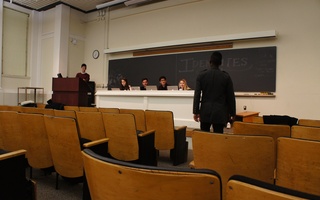The Harvard Extension Environmental Club screened “The True Cost,” a documentary that describes environmental and humans costs of the clothing industry, and hosted a follow-up panel discussion on Friday evening.
Pointing to the emergence of the “fast fashion industry,” referring to the quick and inexpensive manufacturing of trendy designs for consumers to buy at an affordable price, organizers said they hoped to prompt attendees to consider the hidden cost of consumerism when standing in the checkout line at retailers like H&M and Zara.
“Fashion is actually the second largest contributor to environmental pollution after the oil industry,” said Lacey Klingensmith, a student at the Harvard Extension School and the vice president of the the club.
Shot in13 countries, including Bangladesh and India, the documentary featured interviews with fashion designers like Stella McCartney, factory workers and owners, labor activists, academic experts on consumption and sustainability, and farmers.
After the documentary screening, several panelists addressed how consumers can minimize their fashion environmental footprint.
One of the panelists, Bonnie Siefers, the CEO of eco-fashion brand Jonano, urged attendees to go to their closets and pick out just five items and wear only those items for one month.
“I took this challenge, and what I discovered about myself is that I really don’t need most of the stuff that I have in my closet,” Siefers said.
Panelist Sara Ziff, a student at the Kennedy School of Government and the founder and executive director of Model Alliance, a nonprofit labor group for models working in the United States, discussed a documentary on garment workers living in Bangladesh that she is currently producing.
“How can I be doing this work …. and have so little understanding of the garment workers that make the clothes that we wear?” Ziff said, adding that she visited Bangladesh to get a firsthand look at the working conditions of the garment workers there.
“Garment workers are invisible to us in this process,” she said.
Northeastern student Bashair Al Hinai was drawn to the event because of her interest in the fashion industry.
“It’s so easy for us to forget that a human made what we are wearing,” she said. “As soon as we forget that, we lose understanding... We have to acknowledge what happened to get these items to the shelves.”
Read more in University News
I-Lab Medical Teams Focus on Allergies and Sexual HealthRecommended Articles
-
Special Notices.$50.00 reward for any stain that we cannot remove from cloth, or for any garment that is brought to our
-
Special Notices.$50.00 reward for any stain that we cannot remove from cloth, or for any garment that is brought to our
-
Special Notices.$50.00 reward for any stain that we cannot remove from cloth, or for any garment that is brought to our
-
THE CRIMECrash! Business School Boosters have shown lots of sand in convincing the world that business is a profession. Now they
-
 Inclusivity in Fashion: How Harvard’s Next Top Model is Different from America’s
Inclusivity in Fashion: How Harvard’s Next Top Model is Different from America’s













